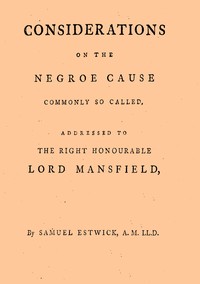Considerations on the Negroe cause commonly so called by Samuel Estwick
"Considerations on the Negroe Cause Commonly So Called" by Samuel Estwick is a legal and philosophical treatise written in the late 18th century. This scholarly work addresses the complex issues surrounding the status of enslaved individuals in British law, particularly in light of the case of Somerset v. Stewart, which questioned whether a slave brought to England was entitled to freedom. The book reflects on the legal principles and societal views about
slavery during a time when the abolition movement was gaining traction. In this work, Estwick provides a comprehensive examination of the legal arguments regarding slavery and property rights, arguing that, according to existing laws and opinions of legal authorities, a slave’s status should remain unchanged upon entering England. He references past judgments and the absence of specific laws governing slavery in England, suggesting that the existing views on ownership and treatment of enslaved people stem more from trade interests than from a legal framework recognizing slavery. Furthermore, Estwick critiques the moral implications of slavery, advocating for a deeper understanding of the human condition and the complexities of racial distinctions. His analysis seeks to navigate the intricate relationship between law, ethics, and human rights in the context of slavery, attempting to strip away the misinterpretations that have clouded the issue. (This is an automatically generated summary.)
Read or download for free
| How to read | Url | Size | |||
|---|---|---|---|---|---|
| Read now! | https://www.gutenberg.org/ebooks/69256.html.images | 141 kB | |||
| EPUB3 (E-readers incl. Send-to-Kindle) | https://www.gutenberg.org/ebooks/69256.epub3.images | 310 kB | |||
| EPUB (older E-readers) | https://www.gutenberg.org/ebooks/69256.epub.images | 310 kB | |||
| EPUB (no images, older E-readers) | https://www.gutenberg.org/ebooks/69256.epub.noimages | 158 kB | |||
| Kindle | https://www.gutenberg.org/ebooks/69256.kf8.images | 281 kB | |||
| older Kindles | https://www.gutenberg.org/ebooks/69256.kindle.images | 261 kB | |||
| Plain Text UTF-8 | https://www.gutenberg.org/ebooks/69256.txt.utf-8 | 117 kB | |||
| Download HTML (zip) | https://www.gutenberg.org/cache/epub/69256/pg69256-h.zip | 332 kB | |||
| There may be more files related to this item. | |||||
Similar Books
About this eBook
| Author | Estwick, Samuel, 1736?-1795 |
|---|---|
| Title |
Considerations on the Negroe cause commonly so called Addressed to the Right Honourable Lord Mansfield, lord chief justice of the Court of King's Bench, &c. |
| Original Publication | United Kingdom: J. Dodsley,1788. |
| Note | Reading ease score: 53.6 (10th to 12th grade). Somewhat difficult to read. |
| Credits | John Campbell and the Online Distributed Proofreading Team at https://www.pgdp.net (This file was produced from images generously made available by The Internet Archive) |
| Language | English |
| LoC Class | HT: Social sciences: Communities, Classes, Races |
| Subject | Slavery -- Law and legislation -- Great Britain |
| Subject | Slavery -- Legal status, laws, etc. -- Great Britain |
| Category | Text |
| EBook-No. | 69256 |
| Release Date | Oct 29, 2022 |
| Copyright Status | Public domain in the USA. |
| Downloads | 84 downloads in the last 30 days. |
| Project Gutenberg eBooks are always free! | |

